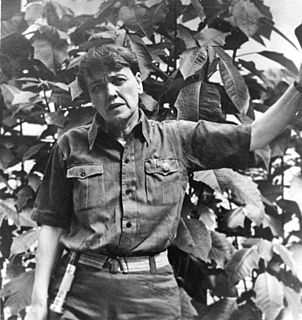A Quote by Daniel J. Boorstin
Our American past always speaks to us with two voices: the voice of the past, and the voice of the present. We are always asking two quite different questions. Historians reading the words of John Winthrop usually ask, What did they mean to him? Citizens ask, What do they mean to us? Historians are trained to seek the original meaning; all of us want to know the present meaning.
Related Quotes
There are a lot of voices inside of us. We have the voices of our parents, our grandparents, our society, our bosses, our own should's and shouldn'ts, and our self-worth is in us, controlling us a lot. When we can get past all of those, and get to the deep, core part of us, there's a voice within our soul that I believe is connected to our Divine or Higher Self. That voice within is there to guide us through all aspects of our lives.
We must abandon completely the notion of blaming the past for any kind of situation we're in and reverse our thinking and see that the past always flows back from the present. That now is the creative point of life. So you see it's like the idea of forgiving somebody, you change the meaning of the past by doing that...Also, watch the flow of music. The melody as its expressed is changed by notes that come later. Just as the meaning of a sentence...you wait till later to find out what the sentence means...The present is always changing the past.
He does not ask much of us, merely a thought of Him from time to time, a little act of adoration, sometimes to ask for His grace, sometimes to offer Him your sufferings, at other times to thank Him for the graces, past and present, He has bestowed on you, in the midst of your troubles to take solace in Him as often as you can. Lift up your heart to Him during your meals and in company; the least little remembrance will always be the most pleasing to Him. One need not cry out very loudly; He is nearer to us than we think.
let us thank God for having made us this gift of death, so that life is to have meaning; of night, that day is to have meaning; silence, that speech is to have meaning; illness, that health is to have meaning; war, that peace is to have meaning. Let us give thanks to Him for having given us weariness and pain, so that rest and joy are to have meaning. Let us give thanks to him, whose wisdom is infinite.
Man can only be certain about the present moment. But is that quite true either? Can he really know the present? Is he in a position to make any judgment about it? Certainly not. For how can a person with no knowledge of the future understand the meaning of the present? If we do not know what future the present is leading us toward, how can we say whether this present is good or bad, whether it deserves our concurrence, or our suspicion, or our hatred?
The least livable life is the one without coherence-nothing connects, nothing means anything. Stories make connections. They allow us to see our past, our present, and our future as interrelated and purposeful.... The stories we value most reassure us that life is worth the pain, that meaning is not an illusion, and that others share our experience with us.
We human beings have enormous difficulty in focusing on the present; we always thinking about what we did, about how we could have done it better.... or else we think about the future, about what we're going to do.... But at this precise moment, you also realize that you can change your future by bringing the past into the present. Past and future only exist in our mind. The present moment, though, is outside of time, it's Eternity.... It isn't what you did in the past the will affect the present. It's what you do in the present that will redeem the past and thereby change the future.








































